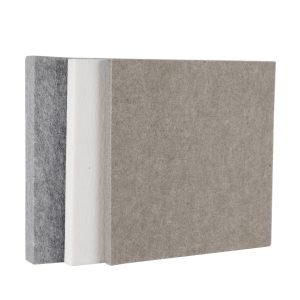Soundproofing can be a game-changer, whether you’re trying to create a peaceful home environment, build a high-quality music studio, or even make your office a quieter place. This guide will walk you through the most effective materials for soundproofing, compare their benefits, and help you choose the best one for your needs.

Why is Soundproofing Important?
In homes, soundproofing can effectively block out street noise, creating a more peaceful and serene living space that enhances relaxation and comfort. This is particularly beneficial for those who live in bustling urban areas where traffic and other disturbances can be disruptive.
For music producers, high-quality soundproofing is essential as it ensures clear recordings without external interference, allowing for the capture of every nuance and detail in their work. This leads to a more professional sound quality in their productions. Additionally, offices greatly benefit from soundproofing as well, fostering a focused and productive work environment.
Mass-Loaded Vinyl (MLV)
Mass-loaded vinyl (MLV) is a widely used soundproofing material known for its high density and flexibility. It is commonly applied in construction and automotive settings to minimise noise transmission through walls, floors, ceilings, and vehicle interiors.
Benefits
- High Density: Excellent for blocking sound transmission.
- Versatile: Can be used on walls, floors, and ceilings.
- Durable: Resistant to moisture and fire.
Cost-Effectiveness and Installation
While MLV can be more expensive than other materials, its effectiveness in blocking sound makes it worth the investment. Installation is relatively straightforward but may require additional support structures depending on the surface.
Acoustic Foam
Acoustic foam panels are specifically designed to absorb sound waves, effectively reducing echo and enhancing sound quality within a room. These panels work by trapping sound energy, which minimises reflections off hard surfaces such as walls and ceilings. This absorption leads to a more controlled acoustic environment, making them ideal for various settings, including recording studios, home theatres, and offices.
Benefits
- Lightweight: Easy to handle and install.
- Variety: Comes in different shapes and sizes for aesthetic flexibility.
- Effective for Absorption: Great for reducing echo and improving internal acoustics.
Cost-Effectiveness and Installation
Acoustic foam is relatively affordable and easy to install using adhesive strips. However, it is more effective for sound absorption rather than blocking sound transmission.
Fiberglass Insulation
Fibreglass insulation is a widely used material in both residential and commercial buildings, typically installed in walls and ceilings to provide effective thermal insulation and sound absorption. This type of insulation consists of fine glass fibres that trap air, creating a barrier that helps maintain indoor temperatures, reduce energy costs, and enhance overall comfort.
Benefits
- Dual Purpose: Provides both thermal and sound insulation.
- Affordable: Generally less expensive than specialised soundproofing materials.
- Effective: Good for reducing noise transmission and echo.
Cost-Effectiveness and Installation
Fiberglass is cost-effective and readily available. Installation requires some DIY skills, as it involves placing the insulation within wall cavities or ceilings.
Green Glue
Green Glue is a damping compound applied between layers of drywall to reduce sound transmission.
Benefits
- Highly Effective: Significantly reduces noise transmission.
- Easy Application: Squeeze tube or bucket application.
- Non-Toxic: Safe for indoor use.
Cost-Effectiveness and Installation
Green Glue is moderately priced and offers excellent value for its effectiveness. Installation is as simple as applying it between two layers of drywall, making it an excellent option for DIY enthusiasts.
Soundproof Curtains
Soundproof curtains are heavy-duty drapes designed to block out external noise.
Benefits
- Simple Solution: Easily installed and removed.
- Multi-Functional: Also provides thermal insulation and light blocking.
- Aesthetic Options: Available in various colours and styles.
Cost-Effectiveness and Installation
Soundproof curtains are generally affordable and extremely easy to install—just hang them like regular curtains. They are an excellent temporary or supplemental solution for reducing noise.
Tips for Selecting the Right Material
- Identify Your Goal: Determine whether you need to block sound or absorb it. For blocking, MLV or Green Glue is ideal. For absorption, consider acoustic foam or fibreglass.
- Consider Your Budget: Soundproof curtains and fibreglass are budget-friendly options, while MLV and Green Glue offer higher effectiveness at a higher cost.
- Ease of Installation: If you’re looking for a quick fix, soundproof curtains are the way to go. For more permanent solutions, MLV and Green Glue are effective but require more effort to install.
Conclusion
Choosing the right soundproofing material depends on your specific needs, budget, and willingness to DIY. Mass-loaded vinyl and Green Glue are top choices for blocking sound, while acoustic foam and fibreglass excel at absorbing it. Soundproof curtains offer a versatile, easy-to-install option for quick noise reduction.
Ready to take the next step? Explore our soundproofing solutions and find the perfect material for your project today. Your quiet, serene space is just a click away!
